#grand democratic alliance
Explore tagged Tumblr posts
Text
[Machine Translation]
LIVE. Future Prime Minister: Macron rules out NFP government option and will resume consultations on Tuesday
Almost two months after the second round of the legislative elections, Emmanuel Macron continues this Monday to receive party leaders at the Élysée Palace, as well as the presidents of the Senate and the National Assembly. With a question in the background: with whom to govern?[...]
[19:38]: Macron rules out NFP government option in name of 'institutional stability' "At the end of the consultations, the President of the Republic noted that a government based solely on the program and parties proposed by the alliance with the largest number of MPs, the New Popular Front, would be immediately censored by all the other groups represented in the National Assembly," the Élysée Palace said in a statement. "Such a government would therefore immediately have a majority of more than 350 MPs against it, effectively preventing it from acting. Given the views of the political leaders consulted, the institutional stability of our country therefore requires that this option not be retained," it added.[...]
[19:59]: "This is an anti-democratic coup that is completely unacceptable," reacts Manuel Bompard.
On BFM TV, the coordinator of France Insoumise, a member of the NFP, castigates Emmanuel Macron's statements refusing a left-wing coalition government. "It's a completely unacceptable anti-democratic coup," judges Manuel Bompard, considering that Emmanuel Macron's argument "makes no sense." "If there is another possible coalition, then the President of the Republic must tell us which one. The President of the Republic is ignoring the results of the legislative elections and acting as if there had not been a vote," continues the LFI elected official. "It is the NFP that must form the country's next government," he insists.[...]
[20:16]: Roussel calls for rallies for the NFP Dissatisfied with Emmanuel Macron's opposition to an NFP government, the communist leader called on BFMTV for "a large popular mobilization" and rallies, particularly in front of "the prefectures."
26 Aug 24
114 notes
·
View notes
Text
Read the interview excerpt or listen to the whole podcast at the link, y'all. Some truth bombs:
In her book on totalitarianism, Arendt talks about the rise of an “unorganized mass” of “mostly furious individuals” with nothing in common except for their contempt for the present order.
She calls this “negative solidarity” and it’s the raw material of totalitarianism, because it’s a world without connection and friendship, where the only basis of collective action is some kind of awful combination of anger and desperation.
She noticed that it’s really easy to work with people’s anger and whip up a mob, and she has this great statement in the book about the alliance between the mob and the elite -- how the elite are quite good at spotting and using the hate that’s already there.
It is things like unemployment. It is things like not being able to keep your home. We’re not just talking about some kind of ennui here. This is raw, real stuff. It’s easy to raise a mob in these conditions. You’re starting with real anger. She says at one point that "Totalitarian politics is a verdict against the world in which people are forced to live." It’s a slap in the face. It’s a finger up against the real conditions of existence.
Totalitarianism works through cynicism. It’s crucial because it allows people to say, “They’re all the same, it’s all bullshit, isn’t it? It’s just politics, isn’t it?” What cynicism allows you to do is be gullible and disbelieving at the same time.
Arendt thought that before a totalitarian ideology could overwhelm reality, it had to first ruin people’s relationship with themselves and others by making them so skeptical and so cynical that they could no longer rely upon their own judgment. So there’s that part of it.
[As an antidote] she imagines thinking as much more than an activity. She imagines it as a way of being. The real gift of thinking isn’t all the great ideas and grand theories that intellectuals come up with. The gift of thinking is that as long as you’re doing it, you have the capacity to judge.
Thinking, for her, is radically democratic. A lot of the time, we all have the capacity to think. We walk around the street. We lose ourselves in our thoughts, and being lost in thought is a gift for Arendt. She says this isn’t time-wasting. This isn’t frivolous. This is what thinking is and we need to take it seriously. I’m not clicking on a bloody “like” or “dislike” or I’m not following another pattern. I am thinking for myself, which, when things are really bad, is all we have.
She argues that without the ability to think, there can not be any judgment. When she really saw that is when she looked at the Nazi officer Adolf Eichmann in Jerusalem in 1961 in the courtroom: a self-important man chattering away, talking self-importantly, not even realizing who he was facing — the relatives and survivors of people he had murdered — and he just spoke in cliches. The longer she listened to him, the more obvious it became that his inability to speak was totally connected with his inability to think, namely, to think from the standpoint of someone else.
#totalitarianism#good advice#a word of warning#make and keep connections with others yall#and with yourselves
88 notes
·
View notes
Text

Original source here; I saw it via @liberalsarecol here. I went a bit off and didn't want to piggyback on their post. (What is the etiquette in these situations? I'm never quite sure.)
They said "Walking away from Trump is healthy." To which I can only respond it's not only healthy, it's damned heroic. Star Trek and US politics thoughts below the cut.
I've been thinking about Damar (from DS9)'s character arc in the final season, and how it to relates to the people swept up in Trumpism. Liz Cheney, Gov. Mike Milley, but also just run of the mill conservatives. They all went along with this cult that is MAGA because it worked for them at some level, because it claimed to give power and voice to something they actually believed in (conservative principles of independence and freedom, an economy that let them support their families, being told who they were was something to be proud of). Not the values that resonate most with me, but I can see someone believing them and acting based on it.
Then came something that should be the bridge too far. The thing they couldn't support. Maybe it affected them personally, maybe it was just extremism beyond what they could swallow. Most people caught up in this movement have a point like that, but not all are brave enough to turn aside. Even if it means admitting they were wrong. Even if that leaves them without a party that represents their view. Even if they have to set aside their own policy preferences and vote for a Democrat because there's more important things at stake.
Which, as I said reminds me of Damar. If you don't know the show, it's built around a war between the various species of the Alpha Quadrant and the Dominion, a fascist regime from the other side of the galaxy. The Cardassians are a militaristic, duty-to-the-state heavy species that makes an alliance with them as a way to get military strength and influence. It doesn't work out so well for them. As Damar, a Cardassian military leader turned rebel terrorist, says:
Seven million of our brave soldiers have given their lives to fulfill our part of the agreement, and what has the Dominion done in return? Nothing. We've gained no new territories. In fact, our influence throughout the quadrant has diminished. And to make matters worse, we are no longer masters in our own home. Travel anywhere on Cardassia and what do you find? Jem'Hadar, Vorta, and now Breen. Instead of the invaders, we have become the invaded. Our 'allies' have conquered us without firing a single shot. Well, no longer.
The thing about Damar is he's no flower child or unblemished angel of a character. I can't remember offhand if he was involved in the occupation of Bajor, but given his background it's hard to imagine he wasn't involved in the occupation of somewhere. He shot Ziyal. it's his personal humiliation more than some grand moral awakening that ultimately drives him to rebel. And probably billions died because of how he tried to pursue power and gave the Dominion an Alpha Quadrant foothold. But when it came down to it he said no more, he gave up his pride and the way he'd woven his pride and position and future in with the Dominion, and he changed course.
I mean, I never thought I'd be cheering on a Cheney either. What a world.
My point is, it's hard to take that leap -- much more challenging than being on the right side of things from the beginning. And while it doesn't wipe away getting it wrong to begin with and all you did because of that, the changing course is still pretty heroic in my book.
50 notes
·
View notes
Text
I feel like I barely have the right to get into “Star Wars would be so good if it were good” posting given that I haven’t actually watched VII-IX, but I keep thinking about the myriad plots and subplots that could follow VI, after the fireworks stop, all without slamming the reset button.
Like, as of Episode VI’s end, Emperor Palpatine, Darth Vader, and Grand Moff Tarkin are all dead, but much of the rest of the Imperial bureaucracy and military are still intact. Maybe there’s a legal chain of succession that establishes who’s next, but probably it’s pretty weak, because tyrants generally don’t like saying “you know who would benefit greatly if I were to ‘accidentally’ drink poisoned blue milk and die? That guy!” So there’s a likelihood of power struggles, different factions emerging among moffs and admirals. How would the Alliance respond to two moffs waging a brutal war against each other, extorting civilians to death for supplies, bombarding civilian population centers that are not logistically accessible enough for their side to extort but that they think the other side will, etc? Can the Alliance afford to intervene to help the innocents suffering in this conflict, or is it best to just let their enemies weaken themselves and clean up afterwards?
Meanwhile, some moffs and governors see the writing on the wall, and are approaching the Alliance and saying “Yes, I was a high official in the Empire, but I was one of the good ones, working within the system to make it as humane and decent as possible. Now I am preparing to join the New Republic, and preparing to hold free elections on my planet(s) (supervised, of course, by the erstwhile-Imperial bureaucracy under my control – who else is around that could competently manage such an affair?) Yes, there are a few incidents during my reign that can be classified as atrocities, but I can assure you that if anyone else in the empire had been in charge, they would have been more numerous and severe (anyone harsher than me would’ve been worse, and anyone gentler would’ve been force-choked to death by Darth Vader and replaced), so let’s just leave those in the past and work together toward a better future.” Can the Alliance accept such a defector on those terms? Can the Alliance afford not to?
At the same time, former members of the senate – dissolved at the beginning of IV – are saying “Alright! With that tyrannical emperor gone, we are ready to get back into the action and help rebuild the Republic,” while more radical members of the Alliance are like “no, FUCK those old senators. Those were the guys who elected Palpatine chancellor. Then they kept giving him more and more emergency powers. Then they voted to make him emperor. Then they stuck around as a rubber stamp Imperial Senate for like fifteen years legitimizing the Empire, before the emperor finally dissolved the senate. A few of them may be okay, but they are all on probationary status in the politics of the New Republic at best, and many of them should be charged with corruption/oath violation/etc and barred from politics and maybe incarcerated/executed.”
Some people might even question the whole idea of One Galaxy Government going forward. Sure, there are advantages to having a singular Republic/Empire coordinating things, but there are risks. Maybe local control – with the risk of the occasional local dictator, or local border war – is safer than putting all eggs into one basket? Coordinating the resources of a galaxy has proven useful in destructive massive scale projects like planet-killer battle stations. Is there a more productive use case for that much broad scale coordination?
As more systems democratize and lift censorship and restrictions on holonet, you get paranoia and rumors going around that this or that office-seeking politician is the Next Palpatine. When a planet’s leading candidate for senator faces rumors of being a Dark Sider, the runner-up currently polling at 48% clears her throat and says “The threat of the Dark Side is too serious to be turned into a political issue, and unfounded rumors and partisan smears do nothing to help us re-establish our still-fragile democratic norms. At the same time, any credible allegations of Dark Side influence merit a thorough and independent investigation. After all, recent experience has shown just how destructive the Dark Side can be: whole inhabited planets got destroyed! Once we establish a transparent, impartial process to examine these claims, we can move beyond all this baseless speculation about my opponent (and the baseless speculation that the first anonymous rumors were traced to a holonet account belonging to my campaign’s chief of staff).” You could have HUAC / McCarthy hearings type shit.
You could have some genuine (aspiring) Dark Side guys – no one who knows the true Sith teachings, but maybe some force sensitives who see the force as a Will To Power thing. (The Jedi haven’t been abducting children who show force potential for decades, and the Sith had no room beyond two, so I guess force sensitives have mostly sorta been figuring out what they could of this stuff themselves for a few decades? Most of them are probably pretty weaksauce compared to trained Sith/Jedi like Yoda or Palpatine, but maybe they can influence weak minds and shit) You could have any combination of actual Dark Side influence and rumors: have some people correctly accuse real Dark Side guys, have Dark Side guys spreading false rumors that their innocent opponents are on the Dark Side, have two different candidates both being Dark force sensitives, spreading rumors about each other (or one spreading rumors, being a down and dirty political fighter, and the other refusing to stoop to that and going for the Stately Above the Fray vibe, but secretly being comparably ruthless), or (perhaps most common) rumors of Dark Side influence being spread in politics when no one involved is actually even Force sensitive let alone in touch with the Dark Side.
You could go a little deeper: some people in the aftermath of the Empire might think that the Force – both the Dark and Light sides – has held the galaxy kind of kind of technical and moral cul-de-sac, accounting for the ways in which the whole setting combines backwardness and advancement:
Why is it that in spite of having overcome the light barrier many millennia ago and being able to build small planet-sized battle stations, they seem to have made negligible progress against senescence and death generally? Because the Force provides a frame in which you either embrace the Dark Side, in which case triumph over mortality is a personal achievement to be hoarded and lorded over your inferiors, or you adhere to the Light Side, in which case you reject the “unnatural abilities” of Dark immortality. Progress against mortality at a collective, civilizational level doesn’t make sense from either of those perspectives.
Why is it that in spite of apparently being fully sentient in many cases, droids are still treated as chattel property without rights? Why is it that they still seem to have widespread animal agriculture? Maybe because the Force doesn’t notice forms of sentience that have no or negligible midichlorian counts or force sensitivity or whatever. Obi-Wan could probably walk past a droid refurbishing facility where droids are getting reset to factory settings, or a slaughterhouse, and not feel any “disturbance in the force, voices crying out in terror and suddenly being silenced” etc, and when the Light Side is treated in some respects as the moral arbiter of the setting, and when a big part of the Light Side is “trust your feelings,” and when the “force feelings” don’t really apply to beasts or droids, they don't get a lot of consideration.
Why is it that the only visions of authority are somewhere on a spectrum from “centralized, despotic autocracy” (the Empire) to “decentralized, semi-feudal oligarchy” (the Republic, with a Polish-Lithuanian Commonwealth-style weak senatorial authority, proliferation of local nobles like counts and princesses, etc, and, perhaps to an even further extent along that spectrum, the Confederacy of Independent Systems)? Maybe because it reflects how the Force tends to structure itself: the Dark Side tends to concentrate power in the hands of a couple of megalomaniacs. The Light Side tends to distribute it across a broader order of Force-wielding elites, but still very rare as a fraction of the population.
You might say that these ideas don’t really get to the essence of the core appeal of Star Wars, which is more like stuff like starfighter battles and lightsaber duels and such, but I’m not saying these themes would necessarily be debated in great detail to the exclusion of action and stuff. They just could be the reason for the lightsaber duels and starfighter battles and such. Consider: in Episode I, the pretext for a lot of the action was a dispute over tariffs. Stated baldly, I think that’s drier than anything I mentioned.
70 notes
·
View notes
Text
A glimmer of hope?
When in doubt about the SAG-AFTRA strike negotiations' state of play, tune in to Variety, the entertainment press grande dame that's been around since 1905.
Something very interesting just caught my eye in this article:
Essentially, they will Zoom over this week-end, with the hope to wrap it up soon enough, before the situation really hits a dire straits level
May I screencap it for you?

IATSE is an acronym for the International [US and Canada] Alliance of Theatrical Stage Employees, Moving Picture Technicians, Artists and Allied Crafts of the United States. They've been around since 1893 and they still represent around 170K people working in the industry. As any Democrat-leaning trade union, they do have a long-standing (and successful) agenda focusing on uniform employment practices across the industry, such as the 40 hour work week. Something they achieved very early on, via the 1941 Fair Labor Standards Act, with Roosevelt's (heh) direct support. Finally, they do have a rather good reputation of tough, but flexible negotiators, as they did manage to avoid last minute a cataclysmic strike in the industry in 2021 (please google it yourself, it would take ages to explain, but that was, IMHO, a smart game right there with AMPTP). And the relationship between IATSE and SAG-AFTRA (including between IATSE's honchos and Fran Drescher) is excellent.
In other words, when a IATSE representative takes the initiative to leak/hint at something, that is immediately published by Variety, you read carefully:

As far as AMPTP goes, the coin seems to have (hopefully) dropped. Costs are starting to pile up:

Dare we hope? My bet is yes, this time. After much fretting, it would seem we are finally going towards some clarity. I am risking a prediction and really hope to nail it:
One week tops to go, unless AMPTP does something really, seriously stupid last minute.
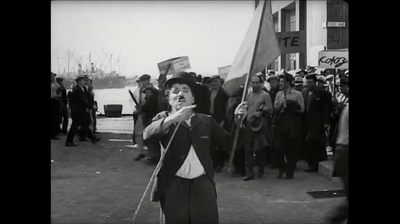
69 notes
·
View notes
Text
By Steve McCann
The alliance of the Democrat Party, the legacy media, and NeverTrumpers entered 2024 brimming with confidence. This dominant faction within the Ruling Class was convinced that its ongoing plans to retain the White House and control Congress could not fail. The champagne was already being stockpiled for the November 6, 2024 post-election celebration.
On November 15, 2022, Donald Trump declared his candidacy for the 2024 Republican nomination. Almost immediately this ruling class alliance conceived a grand strategy they were certain would eventuate in an overwhelming victory and a near-permanent stranglehold on the levers of power in Washington, D.C.
The linchpin of the grand strategy was to make certain Donald Trump was the Republican nominee. They did so by choreographing numerous indictments in Democrat strongholds throughout 2023. The intent of these actions was to so incense rank-and-file Republican voters that they would overwhelmingly support Trump in the primaries in 2024.
This cabal believed with absolute certitude that thanks to their entrenched voting manipulations and unleashing of unprecedented lawfare, they could easily defeat a marginalized and browbeaten Donald Trump regardless who was the Democrat nominee.
Thus, despite Joe Biden’s failures, incompetence, and accelerating mental incapacity, he was coronated as the presumptive nominee while all others foolish enough to contemplate a run in the Democrat primaries were summarily informed they should shelve those ambitions.
4 notes
·
View notes
Text


Trump was elected in part on promises to avoid “endless wars” of the sort that cost American blood and treasure in Afghanistan and Iraq but without resulting in strategic advantage or civilized calm.
Yet as a Jacksonian, Trump also restored American deterrence through punitive strikes against ISIS and terrorist thugs like Baghdadi and Soleimani—without being bogged down in costly follow-ups. During the last four administrations, Putin stayed within his borders only during the Trump four years.
But upon entering office, Trump will likely still be faced with something far more challenging as he confronts what has become the greatest European killing field since World War II—the cauldron on the Ukrainian border that has likely already cost 1-1.5 million combined dead, wounded, and missing Ukrainian and Russian soldiers and civilians.
There is no end in sight after three years of escalating violence. But there are increasing worries that strategically logical and morally defensible—but geopolitically dangerous—Ukrainian strikes on the Russian interior will nonetheless escalate and lead to a wider war among the world’s nuclear powers.
Many on the right wish for Trump to immediately cut off all aid to Ukraine for what they feel is an unwinnable war, even if that abrupt cessation would end any leverage with which to force Putin to negotiate.
They claim the war was instigated by a globalist left, serving as a proxy conflict waged to ruin Russia at the cost of Ukrainian soldiers. They see it orchestrated by a now non-democratic Ukrainian government, lacking elections, a free press, or opposition parties, led by an ungracious and corrupt Zelensky cadre that has allied with the American left in an election year.
In contrast, many on the left see Putin’s invasion and the right’s weariness with the costs of the conflict as the long-awaited global proof of the Trump-Russian “collusion” unicorn. Thus, after the 2016 collusion hoax and 2020 laptop disinformation ruse, they see in some of the right’s opposition to the war at last proof of the Russophiliac Trump perfidy. They judge Putin, not China’s imperialist juggernaut, as the real enemy and discount the dangers of a new Russia-China-Iran-North Korean axis. And to see Ukraine utterly defeat Russia, recover all of the Donbass and Crimea, and destroy the Putin dictatorship, they are willing again to feed the war to the last Ukrainian while discounting escalating Russian threats to use tactical nuclear weapons to prevent defeat.
Trump has vowed to end the catastrophe on day one by doing what is now taboo: calling Vladimir Putin and making a deal that would do the now impossible: entice Russia back to its February 24, 2022, borders before it invaded and thus preserve a reduced but still autonomous and secure Ukraine.
How could Trump pull that unlikely deal off?
Ostensibly, he would follow the advice of a growing number of Western diplomats, generals, scholars, and pundits who have reluctantly outlined a general plan to stop the slaughter.
But how could Putin reassure the Russian people of anything short of an absolute annexation of Ukraine after the cost of one million Russian casualties?
Perhaps in the deal, Putin could brag that he institutionalized forever his 2014 annexations of once Russian-speaking majority Donbass and Crimea; that he prevented Ukraine from joining NATO on the doorstep of Mother Russia; and that he achieved a strategic coup in aligning Russia, China, Iran, and North Korea in a new grand alliance against the West and particularly the United States, with the acquiescence if not support of NATO member Turkey and an ever more sympathetic India.
And what would Ukraine and the West gain from such a Trump art of the deal?
Kyiv might boast that, as the bulwark of Europe, Ukraine heroically saved the country from Russian annexation as envisioned in the 2022 attempt to decapitate Kyiv and absorb the entire country. Ukraine subsequently was armed by the West and fought effectively enough to stymie the Russian juggernaut, wound and humiliate the Russian military, and sow dissension within the vastly weakened Russian dictatorship, as evidenced by the assassinated would-be insurgent Prigozhin.
Trump then might pull off the agreement if he could further establish a DMZ between the Russian and Ukrainian borders and ensure European Union economic aid for a fully armed Ukraine that might deter an endlessly restless Russian neighbor.
It would admittedly be a shaky and questionable deal, given Putin’s propensity to break his word and insidiously and endlessly seek to reestablish the borders of the old Soviet Union.
How then would Trump pull such a grand bargain off, given the hatred shown him by the American left for “selling out Zelensky,” the likely furor from the MAGA base of giving even one cent more than the current $200 billion to Ukraine, and its “endless war,” and the ankle biting from the Europeans who would be relieved by the end of hostilities on its borders but loathe to give any credit to Trump, whom they detest?
What would be the incentives for any such deal, and would they be contrary to both the interests of the American people and the new Republican populist-nationalist coalition?
Yet consider that if Trump were to cut all support for Ukraine, the right would see Ukraine become shortly absorbed—and it would be blamed for a humiliation comparable to the Kabul catastrophe, only worse, since Ukraine, unlike the Afghanistan mess, required only American arms, not our lives.
In contrast, if the endless war grinds on and on, at some point, the pro-war and so-called humanitarian left will be permanently stamped as the callous party of unending conflict and utterly indifferent to the consumption of Ukrainian youth, spent to further its endless vendetta against a Russian people who also are worn out by the war.
Both Russia and Ukraine are running out of soldiers, with escalating casualties that will haunt them for decades. Russia yearns to be free of sanctions and to sell oil and gas to Europe. The West, and the U.S. in particular, would like to triangulate Russia against China and vice versa, in Kissingerian style, and thus avoid any two-power nuclear standoff.
America wants to increase and stockpile its munitions with an emboldened China on the horizon. It is dangerously exhausted by defense cuts and massive aid to Ukraine and Israel while preferring allies like Israel that can win with a few billion rather than perhaps lose after receiving $200 billion. The Republican Party is now becoming the party of peace, and Trump, the Jacksonian, nonetheless the most reluctant president to spend American blood and treasure abroad in memory.
Europe is mentally worn out by the war and increasingly reneging on its once boastful unqualified support for Ukraine. So, it hopes the demonized Trump can both end the hated war and then be blamed for ending it without an unconditional Ukrainian victory.
In short, there are lots of parties who want, and lots of incentives for, an end to our 21st-century Verdun.

2 notes
·
View notes
Text
Dioraden: Nations - Crixus
This is the newly founded homeland of the Tieflings. The population is now almost exclusively tiefling, many of the elves and humans who had been living in the region left in a mass exodus, after all If “one is a curiosity, Two is luck, but three is a comspiracy” then what would you call just shy of a million? Those who stayed faced decades of social discrimination as disgruntled tieflings subjected the new minority to all the same poor treatment that they had faced for centuries.
Founded in the year 976 of the 5th age when Lilleth Karillano formed a nationalist movement and led them in open rebellion against the grand council. Lilleth led a unit made entirely of tieflings in the war of 971 against Aestrena. They went behind the lines of an enemy who would kill their kind on sight and spent several months sabotaging enemy supply lines and ambushing units much larger than their own, this made them folk heroes, especially among other tieflings.
After the war Lilleth spent several years travelling around Anderos with Serapis, sharing that books many stories of Morthos with every tiefling she encountered, imparting to all of them, her belief in a shared culture and history. She used her magic to help those in need and preached a message of tiefling equality and acceptance.
After 4 years of this, Lilleth returned to the east, to the holy site where the first 6 tieflings had been created. From there she sent out a call, summoning every tiefling in Anderos and beyond to her side. They came in a flood, a large and threatening one. Lilleth used their numbers as leverage to demand that the grand council grant them equal rights and protections under the law, but she was not heard, instead the council reacted with fear and raised an army against them. And so a war was begun.
2 years of hard combat and it became clear that the rebels would not break. When Common people across Anderos began to show both open support for the rebels cause and their own dissatisfaction, the council capitulated and a peace deal was formed.
Shortly thereafter Crixus’ norther neighbour, Zikas, called for a crusade to eradicate the “heresy of demon-spawn” that hat formed to their south. Zikas, being a much smaller and less populous country had been relying on the new state being disorganised, and on aid from both Anderos, and their mother country Aestrena. Instead they got nothing. Anderos was too busy reasserting order, and Aestrena was facing an almost unprecedented threat in the north. The war ended quickly when Zikas realised that no help was coming and they chose to surrender the territory they had already lost rather than be overrun.
In the years following this Crixus made efforts to forge strong alliances with the two elven settlements. Providing them with financial and military aide.
Crixus is a democratic republic, legislative power is held by a council of 6 elected elders, one to represent each of the tribes. The elected president acts as a mediator, presiding over and directing council meetings, with no powers bar that of tie-breaker. A perhaps more important duty is that of representative. It is the duty of the president to embody the character and will of the nation as both an inspiration for the people and as an emissary in dealings with other nations.
The primary faith in Crixus is that of ancestral worship. Each family keeps shrines to their own departed family members, to whom they give offerings and pray for guidance.
3 notes
·
View notes
Text
Republic Of Many Nations - Historical Opportunity for Central/Eastern Europe?
(This is a translation of an exhibition created with the cooperation of multiple Slovak and Polish institutions for the study of history that hanged in the corridors of University of Prešov in late 2023. Consider this an introduction to Rzeczpospolita for all my 1670 girlies. It's heavily biased in favor of Rzeczpospolita, luckily in ways that are neither subtle, nor do they detract from its informational value. I am leaving out most of the pictures and the commentary under them, as well as the quotes included - simply because I couldn't fit them into the format of a tumblr article. The notes bellow in [] brackets are mine, the rest of the text is from the exhibition itself, and the pictures, or something close to them - like the same building from a different angle - appeared on the exhibition panels as well. Commentary on the pictures is also from the exhibition.)
***
Did you know that from the end of the 14th century untill the end of the 18th century a unique republic existed in what is now Poland, Lithuania, Ukraine and Belarus, which was the biggest state in Europe and which wasn't founded by military expansion, but by a peaceful alliance of Kingdom of Poland and Grandduchy of Lithuania? This republic gradually fell to the pressure of surrounding absolutist monarchies led by the Tsardom of Muscovy [1], but its legacy persists in the ethos of civil liberties, democratic participation and diversity. Legacy of this republic has become a part of the identity of nations in the Middle/Eastern Europe, which for more than two centuries resisted Russian imperial rule and which cling to these values to this day.
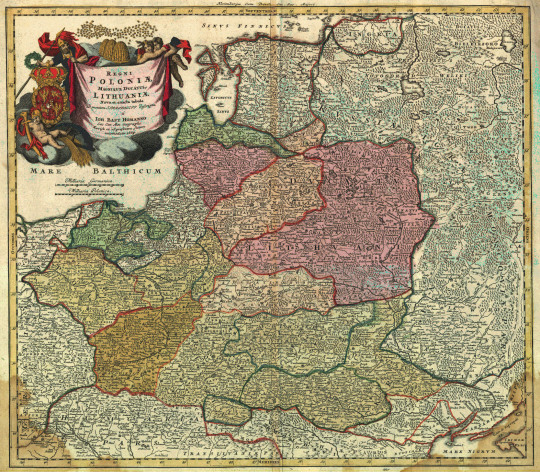
1.) REPUBLIC OF MANY NATIONS The beginings of the "republic of many nations" can be traced to the year 1385, when the hand of Jadwiga, heir to the Polish throne, was offered to Jogaila, the Grand Duke of Lithuania, with the stipulation that he should become a Christian. When Jogaila ascended the throne of Poland as Władisław II. Jagiełło, it created a dynastic link between Poland and Grandduchy of Lithuania, which besides Lithuania consisted of lands in today's Belarus and Ukraine. When on the 1st of July 1569 in the Lublin Castle Polish nobility agreed to extend their privileges to the Lithuanian nobility in exchange for Lithuania ceding large territories to the Polish crown, an agreement was born, on the basis of which a dynastic union transformed into a commonwealth, now called Rzeczpospolita, i.e. The Republic. Though initially the union of these polities was motivated by the existence of common enemies - the Teutonic Order and later Russia - the strongest bond between them turned out to be the unique arrangement established by the Polish and Lithuanian representatives. The "Republic" in the name of this polity was supposed to demonstrate that the Commonwealth would be ruled by its noble citizens regardless of whether their mother tongue was Polish, Lithuanian or Ruthenian (common ancestor of Rusyn, Belarussian and Ukrainian). Though Republic was for hundreds of years plagued by numerous internal issues, and by the end of the 18th century it was destroyed by the aggression of its neighbours, in 1791 citizens managed to approve a unique document - Constitution of 3 May 1791, now considered the first modern constitution in Europe...
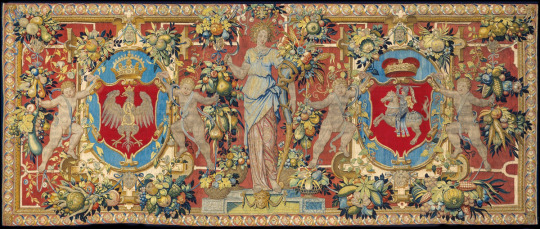
2.) STORY OF THE CROWN AND THE GRANDDUCHY Even after the Union of Lublin, the Polish Crown and Grandduchy of Lithuania were still separate states, just like they used to be for hundreds of years before that. After all, the rulers of Poland had their own archbishopric and royal title since the early 11th century, struggling for power against the likes of Přemyslids, while the grand dukes of Lithuania, attempting to revive the legacy of Kievan Rus', still hesitated whether to accept baptism from Rome or Constantinople. While many of the differences between them disappeared after the creation of Polish-Lithuanian Commonwealth, as the Lithuanian estates adopted the lifestyles of Polish nobility, the grandduchy continued to have their own legislature in the form of so-called Lithuanian Statutes, as well as their own army and finance, and a strong sense of self-determination. However, the connection between Lithuanian and Polish society was very strong - in October 1791, shortly before the final occupation of the Republic by the Prussians, Russians and Austrians both Polish and Lithuanian representatives agreed upon The Mutual Vow Of Both Nations [2], in which they promised that the story of Rzeczpospolita should continue in perpetuity as an indelible federation of the two countries...
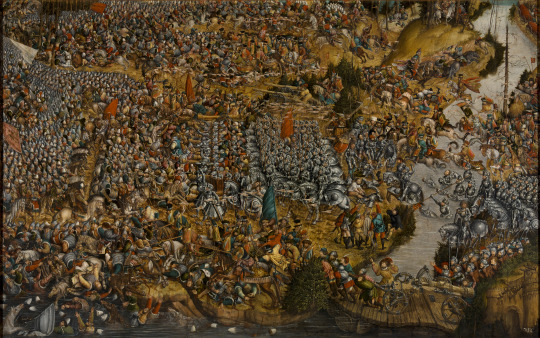
3.) THE STORY OF UKRAINE: A MISSED OPPORTUNITY FOR THE REPULIC? While its name points to a country "somewhere on the edge", Ukraine was a tempting target for many powers since the Middle Ages. After the fall of Mongolian Golden Horde in the 14th century, it was, as the former core of Kievan Rus' added to Lithuania, which presented itself as a continuation of this great Kievan empire. In this way, Lithuania came into the crosshairs of Muscovy, which held similar aspirations. After 1569 the Commonwealth of Poland-Lithuania, which in many ways respected the distinct Ukrainian identity and unlike Moscow didn't consider it to be just a branch of the Russian nation, became its protector from the Muscovite incursion into Ukraine. Even the Polish-Lithuanian nobility living in Ukraine identified and called themselves "Ruthenians", and Grand Duchy of Lithuania used so-called Ruthenian as its official language. Cossacks living in the Wild Fields in the Dnipro river basin, who on the one hand didn't accept the autority of Polish-Lithuanian nobility, on the other hand helped to safeguard the borders of Rzeczpospolita from Moscow and the Ottomans, were also bearers of the sovereign Ukrainian identity. In the middle of the 17th century dissatisfaction of the Cossacks with certain magnates and issues of religion grew into the bloody uprising of hetman Bohdan Khmelnytsky, who in 1654 turned to the Muscovite tsar [1] with a plea for protection. However, among the Cossacks, critical voices towards Moscow could also be heard, especially the voice of Ivan Vyhovsky, who in 1658 made a deal with the Commonwealth of Poland-Lithuania about its transformation into the Republic of Three Nations with a coequal position of the Grand Duchy of Russia [3] and orthodoxy. Because of the opposition from a portion of nobility, Cossacks and Moscow, the agreement never went into effect, and thus both the Republic and Ukraine missed their historic chance...
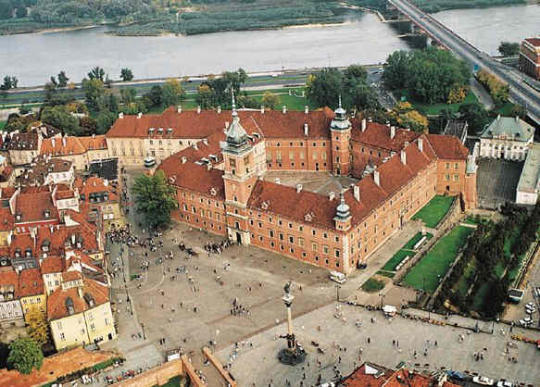
4.) KING IS THE FIRST AMONG US, THE FIRST AMONG EQUALS The creation of Polish-Lithuanian Commonwealth was also a key flashpoint for the transformation of royal power. Since Polish king Sigismund II. August, who thanks to the Union of Lublin became the ruler of Rzeczpospolita, died in 1572 without issue, Polish-Lithuanian nobility in accordance with the original agreement established the viritim election principle, according to which every noble present could elect their own king on special convocational sejms (diets). Ruler elected in this manner had to confirm noble privileges trough the so-called Henrician Articles and a collection of vows Pacta Conventa. Ruler's political power was thus perpetually subject to the rule of law (lex regnat non rex), and if the nobility deemed the ruler's actions unlawful, they could in the case of an emergency even call up a confederation and declare armed resistance. Thus, from then on until the acceptance of Constitution of 3 May 1791, the election of Polish-Lithuanian monarch became subject to the interests of foreign dynasties and local magnate houses. In the 18th century, an era during which the surrounding countries mostly adopted absolutism, the weakness of royal power came to be seen as the fundamental reason for the political decline of the Republic.
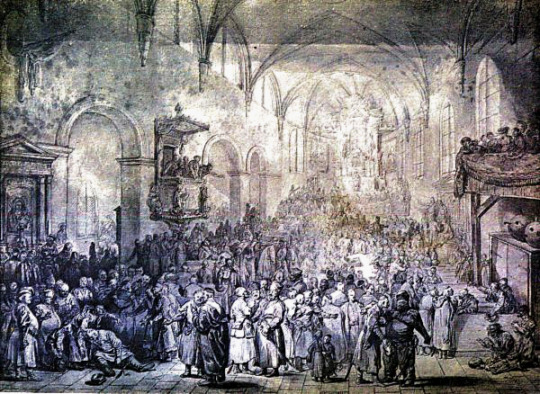
5.) NOT A MONARCHY, NOR AN ARISTOCRACY, NOR A DEMOCRACY The name Rzeczpospolita (the Republic) wasn't chosen for the Commonwealth of Poland-Lithuania by accident. Polish-Lithuanian nobility actually believed that their country can revive the lost ancient legacy of the just polities, and so they considered their Rzeczpospolita, to which they had given the epithet "most serene" [2], to be the third real republic in human history (after the Roman and Venetian ones). Members of the Polish nobility, who were convinced that the noble station brings with itself the duty of civic virtues, thus positioned themselves as the new Aristotles, and considered the so-called mixed constitution, which combined virtues of the monarchy, aristocracy and rule of the people, to be the best way to organize the state. Power in Rzeczpospolita was thus divided between the elected king, the Senate consisting of highest state officials, and a chamber of noble-born representatives, who could use the later infamous liberum veto [4], or the right of individual protest, which especially in the 18th century severely hampered the flexibility of the Republic. However, in the Republic, a specific form of political decisionmaking wasn't practiced only by the parliament of nobles. In Ukraine, the Zaporozhian Cossacks created a very peculiar form of military democracy. In their fortified camps (sietches [2]) the sietch councils formed by direct election, and they in turn elected their military commanders (atamans) and government officials, made decisions about war and piece, economic policy, even legal judgements.
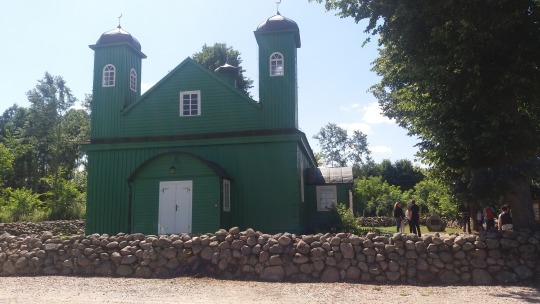
6.) DIFFERENT FAITHS LIVE TOGETHER WITHOUT NEED FOR BORDERS Calling the ancient Republic "Polish" might be misleading, because today the epithet "Polish" is tied mostly to the ethnic nation. However, since in the Polish-Lithuanian Commonwealth, the nation was the nobility, which based its honour on citizen loyalty towards the common polity inspired by antiquity, the noble "nation" at the time included all members of the class no matter the country they were born in, language they spoke, or the faith they professed. That's why, concerning the question of self-perception in the period, we often see the phrase "I am of the Polish nation, but of Ruthenian birth." This citizenship-based definition of Polish identity was closely related to the unprecedented religious tolerance, as codified in 1573 by the so-called Warsaw Confederation. The fact that the noble "nation" included not only Catholics, Lutherans, Calvinists, Uniates and Orthodox Christians, but Mennonites and Arians, led to Rzeczpospolita being called "a state without stacks", because the foreigners there didn't end up burned at a stake, but finding a refuge. However, in the 18th century, this fragile coexistence of different denominations was severely disturbed, because the neighbouring great powers loved to use the rights of religious minorities for their own ends. In the 3 May 1791 constitution, all faiths were thus tolerated, but the Catholicism was supposed to be the state religion.
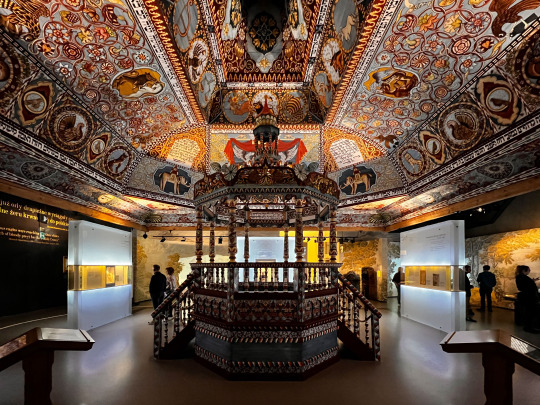
7.) POLONIA PARADISUS JUDAEORUM While the Jewish people were often banished from the rest of medieval European countries, kings of Poland granted many privileges to the arriving Jews. That being not just The Great Charter of Jewish Rights [2] from 1264, but also Privilegia de non tolerandis Christianis, which allowed Jewish merchants to settle in designated communities without Christian competition. Jews gradually gained the right to their own local administration (so-called kahalas) and around the time of the Union of Lublin even to summon their own parliament, called the Diet of the Four Countries [2] (also known as Va'ad). It is therefore no wonder that in the 16th century Europeans started to call Rzeczpospolita "Jewish paradise" and that three quarters of the entire Jewish population of the world lived here. This peaceful coexistence started to suffer in the middle of the 17th century, mainly because of Cossack uprisings, during which thousands of Jews were massacred for being alleged allies of the nobility, while in the 18th century the country experienced general decline in religious tolerance. However, as part of the attempt to save the Republic during the so-called Great Sejm [2] of 1788-1792, a special commission was created to designate the position of Jews within Rzeczpospolita. And when the famous Kościusko uprising defending the independence of Rzeczpospolita and the legacy of the Constitution of 3 May 1791 against the Russian invasion broke out, many Jews didn't hesitate to join the first Jewish regiment and fight in battle for the Republic.
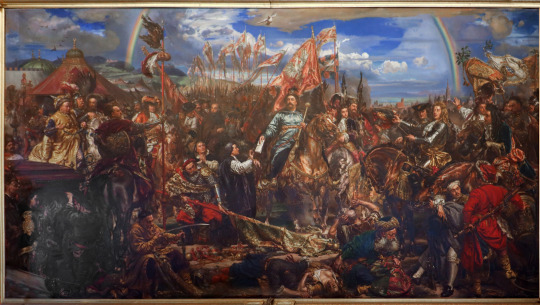
8.) WALLS OF CHRISTIAN EUROPE Noble citizens didn't perceive their Republic as just an embodiment of ancient community, but also a military power. That's why the nobility placed so much value on military virtues and in emulation of ancient Sarmatians, whose descendants they considered themselves to be, they also relied heavily on elite cavalry - the winged hussars, whose exotic appearance and military prowess gained them respect on the battlefield. Polish-Lithuanian nobility, convinced of the exceptional nature of their own Republic, started to perceive their polity as "antemurale christianitatis" - the bastion of Christendom, which protects the eastern borders of Europe from the outside threat. In the 1621 battle of Khotyn the united Polish-Lithuanian army, boosted by thousands of Cossacks led by the hetman of Zaporizhzhia Sahaidachny, a great promoter of cooperation between the Cossacks and Poland-Lithuania, managed to hold back the Ottoman army several times its size. The Polish society connected several such victories to the Divine providence and a faith that the Republic is fulfilling its holy mission in history. This is also the reason why the hussars of king Jan III. Sobieski are to this day considered the saviours of Vienna from the Ottoman siege of 1683 and the madona of Czenstochowa is perceived as the one responsible for the Polish-Lithuanian victory over the Swedes. Though the military glory of the former empire had declined in the 18th century, the enlightenment era reformers didn't forget the valor of their ancestors - the School of Chivalry was established on the prompting of king Stanislaw August Poniatowsky, and among its absolvents was Tadeusz Kościuszko, born in the Duchy of Lithuania, leader of the last stand of the Republic against Russia in 1794.
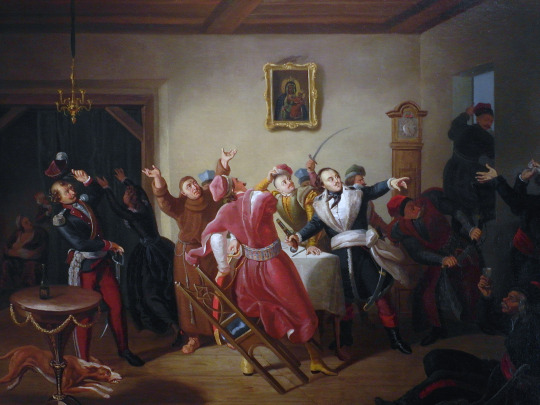
9.) NOTHING ABOUT US WITHOUT US While the king od France could've said "I am the state", in the Polish-Lithuanian Union the state were its citizens, that being the nobility. Nobility's agitation for their privileges gradually bore fruit - particularly important were the neminem captivabimus privilege, ensuring untouchability of a person, and the nihil novi rule, forbidding the king from issuing laws without the approval of a diet of nobles. Power of the nobility was among other things ensured by the size of this estate, since it made up 8-10% of the population (for comparison, in Great Britain, even in the mid-19th century only 6% of the population had a right to vote). In comparison with other countries, all members of the nobility were absolute equals in the eyes of the law. All of these rules were supported by the specific ideology of sarmatism, according to which were all noblemen, as the alleged descendants of the ancient ethnic group, required to protect the so-called "golden liberties" - set of rights and values which made the Polish-Lithuanian nobility consider themselves the most free nation under the the sun. Besides the exotic clothing [5], sarmatism was also expressed in numerous acts of rebellion against their own king - for example, in the 18th century nobility founded the Bar Confederation, which was supposed to rid the Commonwealth of the Russian influence, but ended up leading to the first division of Rzeczpospolita lands among the imperial powers.
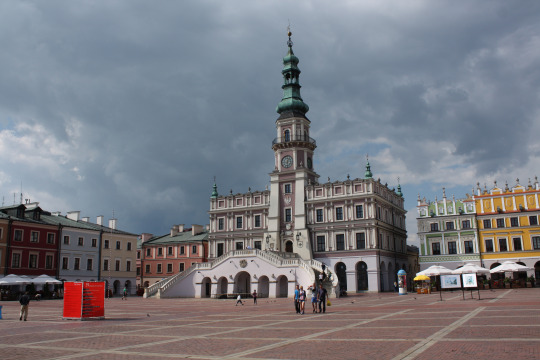
10.) SPLENDOR AND MISERY OF THE MAGNATE FAMILIES Though in the Commonwealth, any use of titles that would distinguish between lower and higher nobility was strictly forbidden, the issue was nonetheless made more complicated by the high economic inequality even among the nobles. Some noble houses were able to create estates so large even the royal holdings paled in comparison. Their dominance rested on their large wealth, high positions in state offices and background influence on politics. This informal class of magnates was most prominent in the eastern part of the country, where a handful of houses amassed giant private armies and sophisticated webs of noble clients, since many of the impoverished nobles voluntarily worked for the magnates, and some even voted in the parliament according to the wishes of their benefactors. These most powerful magnates were thus also titled "little kings", and some of them actually did become elected kings of Poland. The fact that many magnates, especially in Ukraine, were out of the reach of central state power and treated their subjects especially badly led to the outbreak of antimagnate rebellions, the most successful of which was the Bohdan Khmelnytsky Cossack uprising of 1648. However, the magnate activity cannot be seen as black-and-white, because their role also involved foundation and patronage on a grand scale - it was thanks to them that many treasures of Polish-Lithuanian architecture were created.
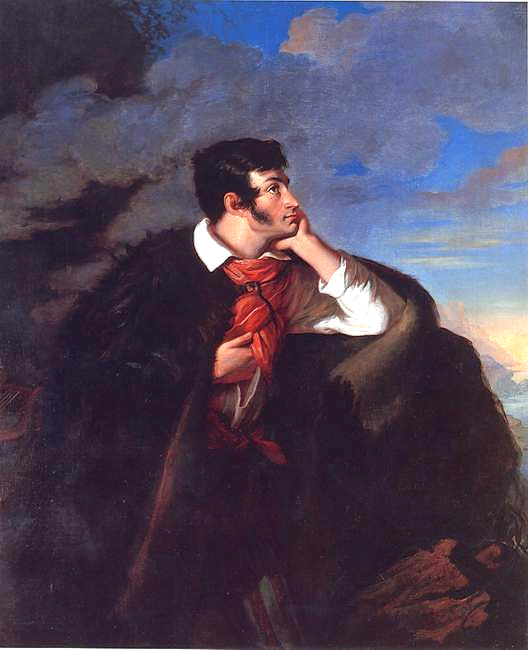
11.) LEGACY OF THE REPUBLIC OF MANY NATIONS The Republic of Poland-Lithuania was erased from the map in 1795. However, its tradition remained in the ethos of fight "for freedom yours and ours", which was echoed by the participants of many antirussian uprisings in the 19th and 20th century. This ethos called back to the tradition of free republic, which, unlike the Russian Empire - that forced subjugated polities to adopt the samoderzhavie [6], orthodoxy and russification triad - supposedly enabled different nations to keep their freedom and "unity in diversity". Although the ethnonationalism of the 20th century has dimmed the memories of their common legacy and caused plenty of bad blood among the different nations of former Rzeczpospolita, the idea of confederation or close cooperation against Russian imperialism was returning in their consciousness, whether during the 1863 uprising or shortly after World War I. In the communist era, the writer in exile Jerzy Giedroyc famously prophesized that Poland can be truly free only when so are Lithuania, Belarus and Ukraine. For Ukrainians and Belarussians, who have been threatened by the imperial idea of Greater Russia and the vision of a unified "Russian world" even after 1991, are heroes (like prince Konstanty Ostrogski or hetman Sahaidachny) and famous moments in the history of the Republic fundamental symbols of their national sovereignty and belonging to the European civilizational space. They will never cease to remind everyone that the Republic is not dead while we are alive and believe that the ties of mutual civic loyalty are stronger than differences in language, faith or ethnic origin, stronger than any enemy that would attempt to tear these ties of our values.
***
[1] - Russia. They are talking about Russia. Y'see, the etymology of "Russian" in Eastern Slavic languages is kinda confusing; originally, it meant all Eastern Slavs, but later on it came to be associated with the largest and most culturally dominant group - which is to say the predecessors of modern Russians under the rule of Princedom of Muscovy. Eventually, Ivan IV., the Grand Prince of Muscovy got himself crown the Tsar of All Russians, which was a bit presumptuous considering a whole lot of people who very much weren't under his rule also identified as the Rus'/Russians. Still, it stuck, and when Ukrainians and Belarussians wanted to define themselves against their Russian overlords, they abandoned the label "Russians" altogether. Calling post-Ivan the Terrible Russians "Muscovites" is a bit of antiquated terminology that would be common in Polish-Lithuanian Commonwealth.
[2] - Literal translation, because I don't know what it's called in English-speaking historical literature.
[3] - Used here in the older sense of the word, i.e. Eastern Slavic in general (see [1]). In this case, the Eastern Slavs in question are clearly mostly Ukrainians despite being called Rus'/Russians (YES I KNOW)
[4] - Okay, so have you seen the first episode? The whole "One of us was against. End of story. We have a democracy." thing was... Barely an exaggeration to be honest.
[5] - Compare the shit Jan Paweł and his friends wear to normal 17th century male clothing (to which Ciesław and especially magnate's son come pretty close to) and you'll get the gist.
[6] - rus. autocracy, or rather the name for specific absolutist tradition of Russian tzars
***
Notes on the pictures:
1.) Map of Rzeczpospolita from the first half of the 18th century (most likely around 1739), made by the cartographer Johann Baptist Homann.
2.) Tapestry with the coats-of-arms of Poland and Lithuania - The Union of Lublin led among other things to the joining of Polish and Lithuanian coats-of-arms, so the new state coats-of-arms combined the polish royal eagle on red field with the traditional symbol of Lithuania, the Pogoń (Vytis in Lithuanian), or the armored knight on a horse, which to this day is part of the legacy of the Grandduchy in modern Lithuanian and parts of Belarussian society.
3.) Battle of Orsha (1514) in which the orthodox prince Konstanty Ostrogski, claiming to carry on the legacy of the Kievan Rus', led the united Polish-Lithuanian forces and destroyed the Muscovite invasion army despite being outnumbered, saving the independence of the Grandduchy. After 1991 the day of the anniversary of this battle was celebrated as a holiday of the Belarussian army. The holiday was later abolished by the Lukashenko regime, one can currently end up in jail for celebrating it. In 2017, a common Lithuanian-Polish-Ukrainian brigade was named hetman Ostrogski.
4.) Royal Castle in Warsaw - Since the late 16th century, Warsaw became the new center of power in the Republic. The Royal Castle, originally the medieval seat of the dukes of Massovia, was rebuilt in the new baroque style. During World War II, the castle was completely destroyed. For a long time, the communist regime was refusing to greenlight its reconstruction, and its restoration based on old engravings and pre-war photographs was only made possible trough the massive public pressure.
5.) Painting of the French artist Jean-Pierre Norblin portrays a traditional part of the political life in Rzeczpospolita - a session of the so-called sejmik (Polish diminutive of sejm, a.k.a. diet). On these local assemblies of nobles of the given region, deputies for the meetings of the central sejm were elected and instructions for these deputies were agreed upon.
6.) Kruszyniany - Presence of the muslim Tartar community is part of the legacy of Rzeczpospolita. Tartars live on the territories of today's Lithuania, Belarus and Poland continuously since the 14th century. They have proven their worth as warriors in service of the Republic. Original Tartar mosques can be found especially in Podlesie in today's northeastern Poland and in Trakai in today's Lithuania.
7.) Ceiling of a synagogue reconstructed for the POLIN Museum of the History of Polish Jews in Warsaw, which in 2015 was awarded the title of Best Museum in Europe. It is in this modern museum that you can learn the most about the Jews of Rzeczpospolita, the largest Jewish diaspora at the time.
8.) Sobieski at Vienna - Painting of Jan Matejko depicts the Polish king Jan III. Sobieski, who after his famous triumph over the Ottoman Turks in 1683 sent a letter to pope Innocent IX., in which he writes that the Christian Vienna was saved.
9.) Casimir Pulaski, later national hero of the United States, escaped Poland after the failure of the Bar Confederation in 1769-1772. The confederation was one of the last attempts to free the country from the increasing dependency on Russia.
10.) Zamoćś - Renessaince city founded by an exceptional person. Jan Zamoyski came from a not very wealthy noble family, but trough his own merits eventually became the richest and most powerful man in the Republic. The town hall of Zamość on the photo.
11.) Adam Mickiewicz could be the symbol of the common legacy of Rzeczpospolita. The greatest poet in the Polish language literature was born in today's Belarus (1798) and always felt like a citizen of Rzeczpospolita. His most important work begins with a line "Lithuania, my fatherland!" It was Mickiewicz who was remembered by the pope John Paul II., when he proclaimed the Polish-Lithuanian Commonwealth the predecessor of cooperation of the entire continent within the European Union ("from the Union of Lublin to the European Union").
12 notes
·
View notes
Text
Kronian Federation (lore post)

The Kronian Federation (the primary setting for the WIP interactive novel Saturnine) is one of the four superpowers of the Solar System. It is a grand alliance of 50 Saturnian moons, many hundreds of space stations and countless semi-independent tribes and territories, all amounting to upwards of two billion people living within the superstate's borders.
Unlike the other major powers of the far future, the Kronian Federation is a democratic and egalitarian society subject to the will of its people. Thrice a Saturnian year, the two non-illegal political parties both select a candidate and mercifully allow the unwashed masses to select their new president. Each vote is then multiplied, divided or discarded depending on the voter's place of birth and current residence. Finally, the corporate overlords of Titan meet to decide whether they feel like committing election fraud to ensure the result they want, a rare occurence given the prevalence of lobbying during election seasons.
Some people (mostly Uranus sympathizers) criticize this system, stating that there's never any difference between the two candidates, but cloned contestants only ran for the position three times* since the Federation's founding in 336 AC. The fears of tax cuts made by nearly every president are also entirely unfounded; Not only is taxation considered theft by 106% of citizens, federal budget can be reliably filled by contractual labor of convicted felons, who in turn get to atone for the crime of being poor and finally contribute something to society for once in their lives.
The Federation is also remarkably tolerant not only to all religions (even shady sects like Christianity and Islam are mostly allowed) but to various forms, races and ethnicities. Even subhumans like Uranians are given a chance to thrive, provided they can fairly compete in the free market and try hard enough to assimilate. Only abominable synthetic creatures like androids are to be killed on sight... for one shall not make a machine in the likeness of a man.
*Candidates Jack Oliver and Jill Oliver were, in fact, just identical twins
11 notes
·
View notes
Text
Looks like his goose is cooked but good!
Unbelievable!!
HEATHER COX RICHARDSON
JUN 10
At 3:00 today, Washington D.C., time, Special Counsel Jack Smith delivered a statement about the recently unsealed indictment charging former president Donald J. Trump on 37 counts of violating national security laws as well as participating in a conspiracy to obstruct justice.
Although MAGA Republicans have tried to paint the indictment as a political move by the Biden administration over a piddling error, Smith immediately reminded people that “[t]his indictment was voted by a grand jury of citizens in the Southern District of Florida, and I invite everyone to read it in full to understand the scope and the gravity of the crimes charged.”
The indictment is, indeed, jaw dropping.
It alleges that during his time in the White House, Trump stored in cardboard boxes “information regarding defense and weapons capabilities of both the United States and foreign countries; United States nuclear programs; potential vulnerabilities of the United States and its allies to military attack; and plans for possible retaliation in response to a foreign attack.” The indictment notes that “[t]he unauthorized disclosure of these classified documents could put at risk the national security of the United States, foreign relations, the safety of the United States military, and human sources and the continued viability of sensitive intelligence collection methods.”
Nonetheless, when Trump ceased to be president after noon on January 20, 2021, he took those boxes, “many of which contained classified documents,” to Mar-a-Lago, where he was living. He “was not authorized to possess or retain those classified documents.” The indictment makes it clear that this was no oversight: Trump was personally involved in packing the boxes and, later, in going through them and in overseeing how they were handled. The employees who worked for him exchanged text messages referring to his personal instructions about them.
Mar-a-Lago was not an authorized location for such documents, but he stored them there anyway, “including in a ballroom, a bathroom and shower, an office space, his bedroom, and a storage room.” They were stacked in public places, where anyone—including the many foreign nationals who visited Mar-a-Lago—could see them. On December 7, 2021, Trump’s personal aide Waltine Nauta took two pictures of several of the boxes fallen on the floor, with their contents, including a secret document available only to the Five Eyes intelligence alliance of the U.S., Australia, Canada, New Zealand, and the United Kingdom, spilled onto the floor.
The indictment alleges that Trump showed classified documents to others without security clearances on two occasions, both of which are well documented. One of those occasions was recorded. Trump told the people there that the plan he was showing them was “highly confidential” and “secret.” He added, “See, as president I could have declassified it….Now I can’t, you know, but this is still a secret.”
This recording undermines his insistence that he believed he could automatically declassify documents; it proves he understood he could not. In addition, the indictment lists Trump’s many statements from 2016 about the importance of protecting classified information, all delivered as attacks on Democratic presidential nominee Hillary Clinton, whom he accused of mishandling such information. “In my administration,” he said on August 18, 2016, “I’m going to enforce all laws concerning the protection of classified information. No one will be above the law.”
The indictment goes on: When the FBI tried to recover the documents, Trump started what Washington Post journalist Jennifer Rubin called a “giant shell game”: he tried to get his lawyer to lie to the FBI and the grand jury, saying Trump did not have more documents; worked with Nauta to move some of the boxes to hide them from Trump’s lawyer, the FBI and the grand jury; tried to get his lawyer to hide or destroy documents; and got another lawyer to certify that all the documents had been produced when he knew they hadn’t.
Nauta lied to the grand jury about his knowledge of what Trump did with the boxes. Both he and Trump have been indicted on multiple counts of obstruction and of engaging in a conspiracy to hide the documents.
Eventually, Trump had many of the boxes moved to his property at Bedminster, New Jersey, where on two occasions he showed documents to people without security clearances. He showed a classified map of a country that is part of an ongoing military operation to a representative of his political action committee.
Trump has been indicted on 31 counts of having “unauthorized possession of, access to, and control over documents relating to the national defense,” for keeping them, and for refusing “to deliver them to the officer and employee of the United States entitled to receive them”: language straight out of the Espionage Act. Twenty-one of the documents were marked top secret, nine were marked secret, and one was unmarked.
These documents are not all those recovered—some likely are too sensitive to risk making public—but they nonetheless hold some of the nation’s deepest secrets: “military capabilities of a foreign country and the United States,” “military activities and planning of foreign countries,” “nuclear capabilities of a foreign country,” “military attacks by a foreign country,” “military contingency planning of the United States,” “military options of a foreign country and potential effects on United States interest,” “foreign country support of terrorist acts against United States interests,” “nuclear weaponry of the United States,” “military activity in a foreign country.”
Smith put it starkly in his statement, “The men and women of the United States intelligence community and our armed forces dedicate their lives to protecting our nation and its people. Our laws that protect national defense information are critical to the safety and security of the United States and they must be enforced. Violations of those laws put our country at risk.”
On Twitter, Bill Kristol said it more clearly: “These were highly classified documents dealing with military intelligence and plans. What did Trump do with them? Who now has copies of them?” Retired FBI assistant director Frank Figliuzzi noted that there is a substantial risk that “foreign intelligence services might have sought or gained access to the documents.”
There is also substantial risk that other countries will be reluctant to share intelligence with the United States in the future. At the very least, it is an unfortunate coincidence that the Central Intelligence Agency in October 2021 reported an unusually high rate of capture or death for foreign informants recruited to spy for the United States.
Since Trump supporters have taken the position that Trump’s indictment over the stolen documents is the attempt of the Biden administration to undermine Trump’s presidential candidacy, it is worth remembering that Trump’s early announcement of his campaign was widely suspected to be an attempt to enable him to avoid legal accountability. Attorney General Merrick Garland appointed Special Counsel Jack Smith precisely to put arms length between the administration and the investigations into Trump.
Smith noted today, “Adherence to the rule of law is a bedrock principle of the Department of Justice. And our nation’s commitment to the rule of law sets an example for the world. We have one set of laws in this country, and they apply to everyone. Applying those laws. Collecting facts. That’s what determines the outcome of an investigation. Nothing more. Nothing less.
“The prosecutors in my office are among the most talented and experienced in the Department of Justice. They have investigated this case hewing to the highest ethical standards. And they will continue to do so as this case proceeds.”
Smith added: “It’s very important for me to note that the defendants in this case must be presumed innocent until proven guilty beyond a reasonable doubt in a court of law. To that end, my office will seek a speedy trial in this matter. Consistent with the public interest and the rights of the accused. We very much look forward to presenting our case to a jury of citizens in the Southern District of Florida.”
Likely responding to MAGA attacks on the FBI and the rule of law, Smith thanked the “dedicated public servants of the Federal Bureau of Investigation, with whom my office is conducting this investigation and who worked tirelessly every day upholding the rule of law in our country,” before closing his brief statement.
The indictment revealed just how much detailed information Smith’s team has uncovered, presenting a shockingly thorough case to prove the allegations. Trump’s lawyers will have their work cut out for them…although the team has shifted since this morning: two of Trump’s lawyers quit today. The thoroughness of the indictment also suggests that Trump and his allies might have reason to be nervous about Smith’s other investigation: the one into the attempt to overturn results of the 2020 election.
Some of Trump’s supporters are calling for violence. After Louisiana representative Clay Higgins appeared to be egging on militias to oppose Trump’s Tuesday arraignment, Democratic senate majority leader Chuck Schumer (D-NY) and House minority leader Hakeem Jeffries (D-NY) issued a joint statement calling for “supporters and critics alike to let the case proceed peacefully in court.” Legal scholar Joyce White Vance noted that it was “extremely sad for our country that this isn’t a bipartisan statement being made by leaders from both parties.”
A lengthy and complete summary
#Trump federal indictment
16 notes
·
View notes
Text
The Long 35th Century
[V v late addition to turn 15: 9-3-3-1=2]
The collapse of the centralized control over most of the underworld, and the outbreak of brutal war caused a disruption of all underworld trade, massive depopulation of central areas, and an overextension of the Royal armies. Internal and external enemies take notice
The Empire Is Struck Back
Sensing the weakness of Chivik, the long-suffering tribes closest to the see the time is right to retailiate for the many historic mistreatments andhumiliations. At first they simply participate on the side of rebels as mercenaries, or engage in banditry, but the charismatic brother of the Kilklak matriarch fosters personal relationships with the leaders of many other clans and tribes, and promotes a branch of the circadian cult that yearns for a return to the "good old days" when all tiktik lived in tribes, and there were no decadent city-dwellers. With a combination of traditional personalistic alliances and a formalized priesthood connecting the tribes, he manages to unite most of them in a grand confoederation. The Confoederation of Free Tribes raises a vast army, and manages to defeat what arnies Chivik can bring to bear, and capture the city of Tranos, which had long been a thorn in their side. The city is promptly renamed Kilklak, but it is mainly used as a garrison, with only little civilian activity; a base of operations for further attacks eastward. The confoederation is led by an agreed-upon Matriarch (often from the Kilklak clan) but her prime councillor is always the high priest, and a very conservative agenda tends to dominate the political programme.
The Second One True Empire
Tanmak also sees the scattered Royal armies and the long response times and mobilizes its population. A quick march takes them to the relatively undefended eastern edge of Retvik. The Retvikvik are convinced that their interests are better served by submitting to the Empress of Tanmak, and the fledgling empire gains control of this most vital chokepoint without a fight, securing the entirety of the east. The Empress declares herself the rightful sovereign of the entire world, though in practice that only means Tanmak is now truly independent. A variant of circadianism is established as state religion, centering on the empress dynasty as a manifestation of eternal renewal, and the holy land of Erjul, as a place where the sunlight spills into the underworld and many pilgrims go there to bathe in the waters that carry the light, though it is a very dangerous excursion to any that need to breathe.
Rebel rebel
In Fikset city, the successive escalating crises, and ineffective responses of the central government are met with joy. The city is hit hard by the loss of trade, and increased taxes, but the population is united in opposition to Chivik rule, and are now finally able to drive out the occupation forces. Since the former glory days of independent Neskot are fondly remebered, that name is reintroduced, but the original ruling clan was long ago driven into extinction. Instead, the Independent and Free City State of Neskot is ruled more or less democratically. The most important body is the assembly, where each of the citizen clans with more than 144 members sends their representatives, but each year they elect one amongst themselves to become a "Neskotkot". These are a "clan" only in name, but do form a government, usually with a dozen or so members
2 notes
·
View notes
Text
[ad_1] New Delhi- Delhi Chief Minister Rekha Gupta, along with her council of ministers, took oath as members of the Legislative Assembly on Monday, marking the beginning of the first session of the newly-elected House. Alongside CM Gupta, BJP ministers Parvesh Verma, Ashish Sood, Kapil Mishra, Ravinder Singh Indraj, Pankaj Kumar Singh, and Manjinder Singh Sirsa were sworn in. Aam Aadmi Party (AAP)’s 22 MLAs, including Leader of Opposition Atishi, also took the oath during the session. Rekha Gupta had earlier taken oath as Delhi’s Chief Minister on Thursday at a grand ceremony at Ramlila Maidan, attended by Prime Minister Narendra Modi, Defence Minister Rajnath Singh, and Chief Ministers from BJP-ruled states. The event, marking the BJP’s return to power in Delhi after 27 years, was seen as a major political milestone for the National Democratic Alliance (NDA). With her appointment, Rekha Gupta becomes the fourth woman Chief Minister of Delhi, following Sheila Dikshit, Sushma Swaraj, and Atishi. She is also the fourth BJP leader to hold the post, succeeding Madan Lal Khurana, Sahib Singh Verma, and Sushma Swaraj. The first session of the Delhi Assembly, scheduled to last for three days, commenced with BJP MLA Arvinder Singh Lovely taking oath as the pro-tem Speaker. Lieutenant Governor (L-G) Vinai Kumar Saxena administered his oath at Raj Niwas. The pro-tem Speaker will oversee House proceedings until a full-time Speaker is elected, with the election scheduled for 2:00 p.m. today. As per the Assembly bulletin, L-G Saxena will address the House on February 25, followed by the tabling of reports from the Comptroller and Auditor General (CAG). The post Delhi CM Rekha Gupta, Ministers Take Oath as Legislative Assembly Begins First Session appeared first on Global Governance News- Asia's First Bilingual News portal for Global News and Updates. [ad_2] Source link
0 notes
Text
[ad_1] New Delhi- Delhi Chief Minister Rekha Gupta, along with her council of ministers, took oath as members of the Legislative Assembly on Monday, marking the beginning of the first session of the newly-elected House. Alongside CM Gupta, BJP ministers Parvesh Verma, Ashish Sood, Kapil Mishra, Ravinder Singh Indraj, Pankaj Kumar Singh, and Manjinder Singh Sirsa were sworn in. Aam Aadmi Party (AAP)’s 22 MLAs, including Leader of Opposition Atishi, also took the oath during the session. Rekha Gupta had earlier taken oath as Delhi’s Chief Minister on Thursday at a grand ceremony at Ramlila Maidan, attended by Prime Minister Narendra Modi, Defence Minister Rajnath Singh, and Chief Ministers from BJP-ruled states. The event, marking the BJP’s return to power in Delhi after 27 years, was seen as a major political milestone for the National Democratic Alliance (NDA). With her appointment, Rekha Gupta becomes the fourth woman Chief Minister of Delhi, following Sheila Dikshit, Sushma Swaraj, and Atishi. She is also the fourth BJP leader to hold the post, succeeding Madan Lal Khurana, Sahib Singh Verma, and Sushma Swaraj. The first session of the Delhi Assembly, scheduled to last for three days, commenced with BJP MLA Arvinder Singh Lovely taking oath as the pro-tem Speaker. Lieutenant Governor (L-G) Vinai Kumar Saxena administered his oath at Raj Niwas. The pro-tem Speaker will oversee House proceedings until a full-time Speaker is elected, with the election scheduled for 2:00 p.m. today. As per the Assembly bulletin, L-G Saxena will address the House on February 25, followed by the tabling of reports from the Comptroller and Auditor General (CAG). The post Delhi CM Rekha Gupta, Ministers Take Oath as Legislative Assembly Begins First Session appeared first on Global Governance News- Asia's First Bilingual News portal for Global News and Updates. [ad_2] Source link
0 notes
Text
Progress in Expanding Anti-Government Alliance
Opposition Grand Alliance to Hold Major Meeting in Islamabad – Sources

The Opposition Grand Alliance has decided to hold a major meeting in the federal capital as part of its anti-government movement.
According to sources, the alliance has scheduled a conference in Islamabad on February 26 and 27, inviting all opposition parties to participate. The conference will determine the future course of action and set the agenda for the movement against the government.
Sources confirm that all member parties of the Opposition Grand Alliance will attend the conference. Additionally, a joint committee has been formed between Tehreek-e-Tahafuz-e-Aain and the Grand Democratic Alliance (GDA) to strengthen the anti-government coalition.
As part of the expansion process, representatives from both alliances have been nominated to the committee. The GDA will be represented by Dr. Safdar Abbasi, Sardar Raheem, Zain Shah, and Hasnain Mirza, while Salman Akram Raja, Sahibzada Hamid Raza, Nasir Shirazi, Haleem Adil Sheikh, Sajid Tareen, and Akhunzada Hussain Yousafzai will represent Tehreek-e-Tahafuz-e-Aain Pakistan.
Sources further revealed that the committee will finalize the key points of the joint political struggle. Following this, the next opposition alliance meeting is set to take place in Islamabad on February 26 and 27.
0 notes
Text
NDA Chief Ministers meet after Delhi CM’s swearing-in; PM Modi attends
A meeting of Chief Ministers of the National Democratic Alliance (NDA)-ruled states got underway in the national Capital on Thursday, hours after the grand swearing-in of new Delhi Chief Minister Rekha Gupta and her Cabinet ministers at the city’s iconic Ramlila Ground. The meeting was attended by the CMs of BJP-ruled states and those ruled by key constituents of the NDA alliance — TDP and…
0 notes